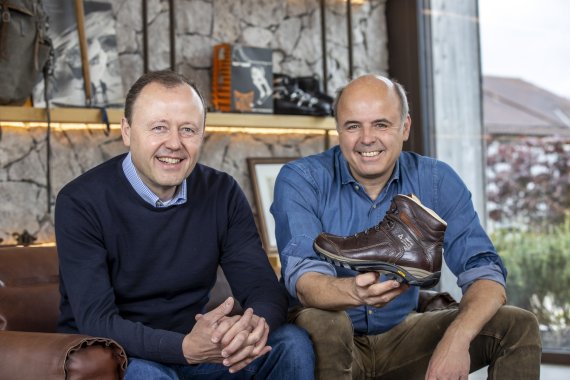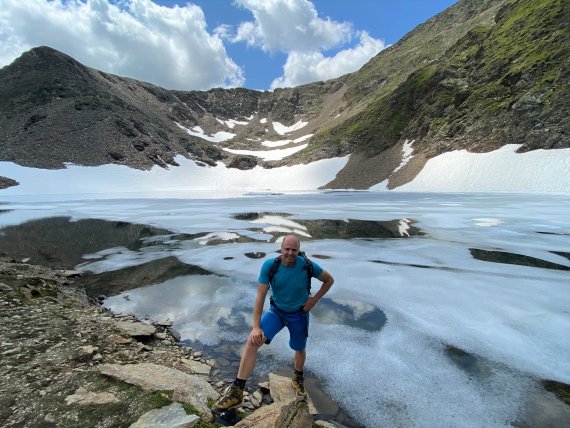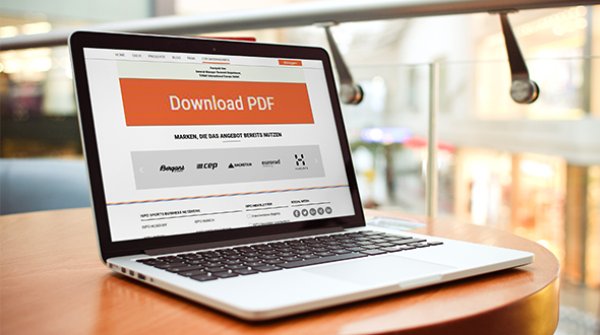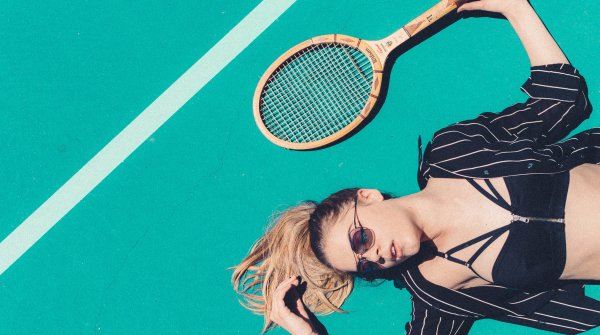
My name is Lukas Meindl. I learned the shoemaking trade with passion and have been running the business of the Meindl family company together with my brother Lars Meindl in the 9th generation in uninterrupted succession as a shoe technician since 1990. From the Kirchanschöring location, where we have been producing shoes for over 300 years, which then as nowstand for quality, innovation and tradition.
Lars and I have divided up the management: my brother is in charge of the commercial side, and I am responsible for production and development.
In my guest article, I show you which multi-layered challenges and opportunities are currently associated with the production of mountain boots, what it means to be a specialist and why sustainability at Meindl is not a goal, but a path.
For me as CEO, there is no "biggest challenge". There are new challenges every day that we, that is Lars and I, have to solve together with our employees in our position. That is part of our job and it is constantly changing. Especially in view of the pandemic, where the challenges are multi-layered.

Corona has made a jolt through the whole world. In the last year, no one knew what was going to happen next. It was our job to hold the company together. To make sure that everyone pulls together - that we go ahead and form a strong team. To do that, you have to know exactly where you want to go, what makes you tick as a company. That's important! We've been working harder than ever. Especially when retailers and specialty retailers, our most important partner, had closed for a long time. Even though retailers with well-functioning online shops recovered more quickly, there was less consumer demand at first. Not least because Germany was in a standstill position for the longest time. Many markets were open - but specialist retailers were not.
These difficulties were there even though we as a company are very well positioned in terms of our basic orientation. Meindl is a brand that has been known for many years; has made a name for itself through quality, innovation - and is very well positioned internationally. That was one of the keys: because if we had only been able to rely on the German market, it would have caused us far more problems.
During the crisis we were brave and decided to continue producing. We were sure that we would soon need the shoes we produced again, and fortunately that was the case. Nature and the experience of nature have moved into focus. As a result, mountain boots were and are in demand, which gave us a new lease of life as a mountain boot specialist. So from a standstill, we suddenly went into a high demand situation.
However, with the continued strong demand, other problems arise today. Like the procurement of raw materials: The material cycles are running poorly, the demand for materials is enormous. Prices for all materials are rising sharply accordingly. We have to organise ourselves in such a way that we do not run into any supply problems and can reliably serve our specialist retail partners and thus the consumer.
We work closely with our supply chain partners, maintain long-term partnerships and can thus create continuity and balance out fluctuations. This creates quality assurance and planning reliability.
If we look further into the future, there will be even greater price pressure in the future, inflation will have an impact on the product. What does that mean for us as a brand? People will have to buy more consciously again, pay more attention to quality. High-quality and durable products are moving further into the foreground.
My brother Lars and I grew up in the company. We played and lived where mountain boots are made. As I got older, I asked myself: Why exactly do we make mountain boots and nothing else? My fanatically mountain-loving father's answer was simple, "You can tell the difference by the mountain boot." Because what may not be so visible in fashion at first: on the mountain you can immediately feel the difference of a good shoe.
For the mountain boot buyer, it is important to buy a high-quality, functional product. And he needs the product that fits best. That's why 40 years ago we werethe first mountain boot manufacturer in Europe to equip boots with GORE-TEX. Even back then, my father saw this as the solution to making shoes waterproof. The development of a processing technology for the material on the shoe was our challenge .

Our goal is not to become much bigger, we want to become better. Because if we are good and have a product that is wanted and needed, then we are automatically in the market. That's why we have always pursued simple but important goals and at the same time want to be an innovative and cooperative company: We want to be specialists in shoes, stick to our production sites and be a good partner for retailers.
Being a specialist also means: We only make shoes. We don't need any additional tasks. That is also a key. We want to understand shoes better - and be able to think intensively about problems. The complexity of a shoe is enormous - probably one of the most complex topics on the market. It's exciting and fulfilling. Our models are developed entirely in-house, from shoe last to sole.
Awareness of quality definitely needs to grow further. This is in line with the important topic of sustainability. Sustainability teaches people to focus on quality and to make sure they buy a long-lasting product. The energy input for many products is so enormous that you have to ask yourself: Do I need this?
Sustainability is a very big word, and I don't just want to reduce it to 1.5 degrees of global warming andCO2 emissions. If we look at that alone, we won 't change enough. You have to challenge yourself and ask: What do I really want and what do I accept for it? I always put it this way: we used to be frugal. The whole of society. We at Meindl have always been thrifty because of our craftsmanship. Something was created from every scrap. 100% material usage is still the goal today - but function and durability are always in the foreground.
Sustainability at Meindl is not a goal, but a path we have been following for a long time. For us, it has always been a matter of consciously and carefully using resources. We pursue sustainability out of tradition. Now we are also making this more visible for everyone with our defined EcoSteps.

Sustainability today means: using the available technologies and creating awareness of what you want to change. We have to be clear: We can't change everything in one night. It is a process. Strict sustainability means: we go way back, do without everything and keep quiet. We don't want that as a society.
One thing we are aware of at Meindl: when we produce, we create waste and garbage. The only question is: How much is it - and what is it? We try to find answers to this - and not just since yesterday. We show buyers transparently what we are doing in terms of sustainability.
It is also important to realize that there are many materials on the shoe that we currently can not do without. We need leather, rubber, PU, EVA and certain metals. We look at each product in detail to see how we can optimize it. This is the only way we can continue to develop. This is a process that is ongoing. At the same time, the shoe must never lose performance so that the wearer can rely on it 100 percent.
One important contribution we make, for example, is to improve adhesives in terms of their environmental friendliness. That means reducing the use of solvent-based adhesives in areas where we can do without them, or switching to water-based products for care products. The other is PFCs, which we have greatly reduced for the sake of nature. and will be completely eliminated in a few years. The are important steps.
The most sensible and sustainable thing to do is to wear a shoe for as long as possible: a mountaineering shoe will eventually become a gardening shoe, serve as a bad-weather shoe. Of course, a lightweight multifunctional shoe has a shorter lifespan than a mountain shoe made of 2.5 millimeter thick leather. It is heavier, but it also lasts more. On average, it takes five to seven years before this shoe needs to be resoled. You don't need a new shoe for that.
If the shoe is in good shape, you can always resole it. We often have shoes in for resole that are over 30 years old. Such a shoe is always something special. It and the wearer are connected by a lot of history.

In the time in which I grew up, we exclusively made heavy mountain boots. Today, you need a wide range of shoes to have a position in the markets and to be a strong partner for the specialist trade - and that's what they need and demand. Today, the heavy shoe is no longer the focus as a mountain shoe. Today's customers want much lighter shoes.
And: In the past, we lived in a society where people had one pair of outdoor shoes with which they did everything. Today we have many shoes in our wardrobe: from climbing shoes to multifunctional shoes, trail running shoes or barefoot shoes. Nature has become a huge playground.
That's another reason why you have to be broadly positioned as a specialist. I am convinced that the future belongs to the specialists. We remain true to the shoe.
 Sports BusinessMental Health Awareness Month: A global appeal
Sports BusinessMental Health Awareness Month: A global appeal Sports BusinessValues in the sports business - strategies for more authenticity
Sports BusinessValues in the sports business - strategies for more authenticity
- Awards
- Mountain sports
- Bike
- Fitness
- Health
- ISPO Munich
- Running
- Brands
- Sustainability
- Olympia
- OutDoor
- Promotion
- Sports Business
- Textrends
- Triathlon
- Water sports
- Winter sports
- eSports
- SportsTech
- OutDoor by ISPO
- Heroes
- Transformation
- Sport Fashion
- Urban Culture
- Challenges of a CEO
- Trade fairs
- Sports
- Find the Balance
- Product reviews
- Newsletter Exclusive Area
- Magazine





